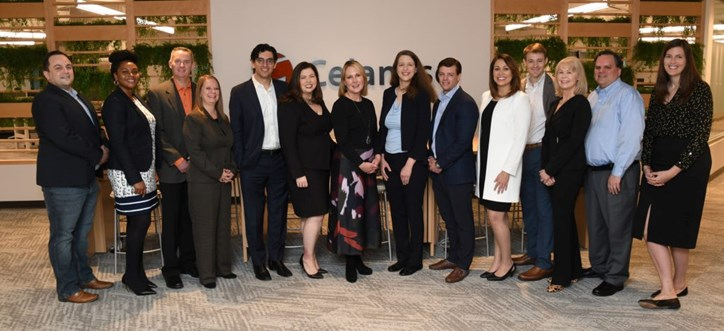Stories
Innovation in Collaboration: Why Pro Bono Works Better Together
Although most pro bono legal efforts are spearheaded by law firms, some forward-thinking corporations are co-developing support programs of their own. Innovative case in point: a new program begun at Celanese — the global chemical and specialty materials company based in Dallas — that pairs Celanese’s in-house counsel and legal staff with Sidley lawyers to take on inspiring and far-reaching pro bono projects on such topics as immigration, veterans’ benefits and the arts. Spearheaded just last year by Anne Brooksher Yen, Celanese’s chief compliance officer and chief counsel for litigation, environmental health and safety, and quality, the cross-over program has already created new opportunities for Celanese and Sidley’s “skills-based volunteerism,” as Brooksher-Yen puts it, and prompted The Texas Lawbook and the Association of Corporate Counsel’s DFW Chapter to recognize Celanese, Sidley and Haynes and Boone, LLP (a firm that had partnered with Celanese on border crisis work) with their 2019 Creative Partnership Award.
We spoke with Brooksher-Yen to hear how the Celanese-Sidley collaboration came about, why it works and how merging pro bono efforts puts a new spin on standard law firm/company relations.
Well before your partnership with Sidley, you were a passionate advocate for pro bono work, especially immigration and asylum cases. What drew you to it initially?
Anne Brooksher-Yen: I grew up on the border and have two small children, so asylum work was a natural point of interest. I’ll be honest, pro bono is the hardest work that I do. There are challenging legal issues, and the stakes are really high. I do it because it’s the right thing to do and because lawyers are in this fairly unique position in the world. We’ve been granted a monopoly on an entire industry. When you have that type of power and privilege, I think it comes with certain responsibilities, including giving back to people who most need legal services or are least able to afford them.
Why did you choose to partner with Sidley?
ABY: Sidley offered what I refer to as a “virtual firm experience.” Sidley basically said, “Here’s a list of everything we’re working on; tell us which cases your lawyers are interested in pursuing, and we will find a case for them.” It allowed us to partner with Sidley lawyers and take advantage of Sidley’s infrastructure, depth and reach in a way that we could never replicate internally.
What types of pro bono work did people take on?
ABY: Everybody has been able to do it differently. Veterans’-rights and grandparents’ rights cases; work for local charitable boards, the arts.
How have you measured the success of the partnership?
ABY: One way, of course, is just in numbers. Take, as an example, the veterans’ benefits clinic that Sidley hosts. Because Celanese brought so many people to the event and Sidley matched that participation, for the first time we were able to not only work in the office with folks who came in physically but also reach disabled veterans over the phone and video conference.
In terms of success internally, it’s been a great opportunity for us to partner with Sidley’s lawyers in a meaningful yet discrete way and build ties and friendship.
How did the collaboration affect your own pro bono work?
ABY: So what I’m interested in are big, meaty public-interest litigations, which is something that Sidley is uniquely positioned to allow me to do. They looped me into a prison conditions/solitary confinement matter in Oklahoma and a “public charge” litigation, on behalf of a client in Illinois, that challenged the administration’s limits on immigration based on means. If you were a person who relied on any kind of public benefits — like the Supplemental Nutrition Assistance Program (SNAP) or Medicaid — that made you ineligible for legal status.
It’s deeply troubling for a lot of reasons, but one of the biggest is that it adversely impacts families where children have legal status and are entitled to benefits but their parents do not. Some parents will take their family off benefits.
What happened to that case?
ABY: Sidley challenged the regulation in Illinois federal court and was successful in obtaining an injunction. The injunction held all the way up to the Supreme Court, where it was stayed pending appeal earlier this year (with a strong dissent from Justice Sotomayor). Sidley is going back to the Seventh Circuit to make sure the original order sticks.
How do you respond to a setback like that?
ABY: I believe that “fighting the good fight” is not one fight; it’s a million little fights. You have to keep looking for ways to make a difference. Even when you lose, there’s power in the challenge. I think it’s really important to make sure that people in positions of power know that they are being carefully watched.

Celanese Team Members 2020 Pro Bono Partnership
Offices
Related Pages
- Stay Up To DateSubscribe to Sidley Publications
- Follow Sidley on Social MediaSocial Media Directory